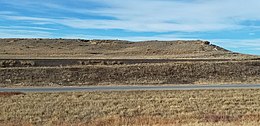Fox Hills Formation
| Fox Hills Formation Stratigraphic range: Late Cretaceous |
|
|---|---|

A ridge capped by a sandstone bed of the Fox Hills Formation west of Limon, Colorado
|
|
| Type | Geological formation |
| Unit of | Montana Group (MT,ND) |
| Sub-units | Fairpoint member (SD), Trail City member (ND,SD), Timber Lake (ND,SD), Lincoln member (CO), etc. |
| Underlies |
Lance (WY)/Hell Creek (MT) Laramie Formation (CO) |
| Overlies |
Pierre (USA)/Bearpaw (CAN) Lewis Shale (WY,MT) |
| Thickness | 75-225 feet |
| Lithology | |
| Primary | Sandstone |
| Other | Shale |
| Location | |
| Region |
|
| Country | United States/Canada |
| Type section | |
| Named for | Fox Hills between Cheyenne and Moreau Rivers, South Dakota |
| Named by | Meek and Hayden |
| Year defined | 1862 |
The Fox Hills Formation is a Cretaceous geologic formation in the northwestern Great Plains of North America. It is present from Alberta on the north to Colorado in the south.
Fossil remains of dinosaurs, including tyrannosaurs, as well as large marine reptiles, such as mosasaurs, have been recovered from the formation.
The Fox Hills Formation consists of marginal marine yellow to grey sandstone with shale interbeds. It was deposited as a regressive sequence of barrier islands during the retreat of the Western Interior Seaway in Late Cretaceous time. In its eastern extents, the formation is underlain by the marine Pierre Shale in the United States and by the equivalent Bearpaw Formation in Canada, while in western ranges in Montana and Wyoming it overlies the Lewis Shale. The Fox Hills is overlain by continental sediments of the Laramie Formation in Colorado and the Lance Formation in Wyoming, the later being the equivalent of the overlying Hell Creek Formation in Montana.
...
Wikipedia
